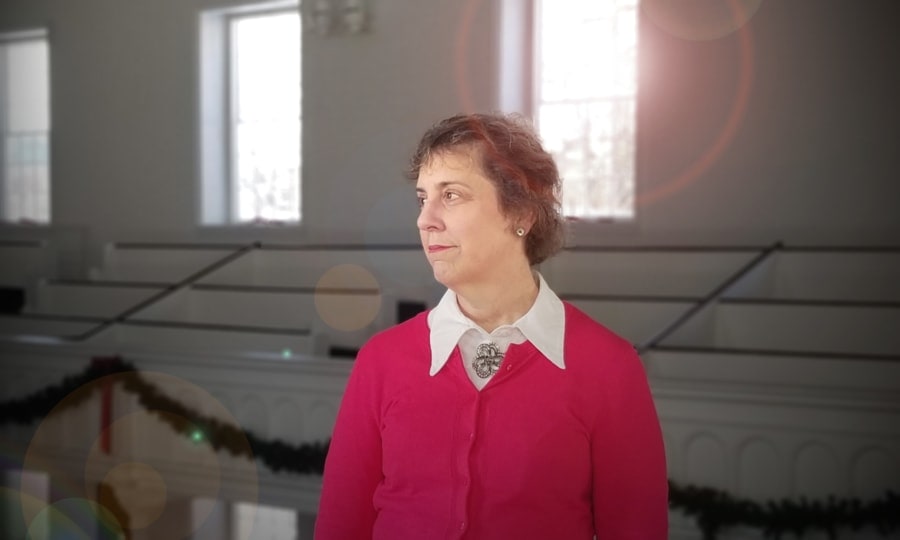Stories

The Grace to Hope: Elizabeth’s Story
“ I learned that Christmas twenty-four years ago that without Hope, it’s hard to find Peace, hard to recognize Joy, hard to share Love. ”Listen to Story
Twenty-four years ago I became a patient in a psychiatric ward over Christmas week. I’m admitted to the hospital around 10 p.m. on Christmas Eve, and after a talk about despair with a gentle, down-to-earth psych nurse I go to sleep. The next morning I meet the people who give me an amazing Christmas.
Marissa, an African-American woman about my age and a fellow patient, sits next to me at breakfast and begins to hum. “What song is that?” I ask.
“‘The Lollipop Song’ from The Wizard of Oz.” She stands up and performs the Munchkin’s song-and-dance when Dorothy lands in the strange place far from Kansas.
“We represent the Lollipop Guild, the Lollipop Guild, the Lollipop Guild. And in the name of the Lollipop Guild we wish to welcome you to Munchkin Land. We welcome you to Munchkin Land. Tra la la la la.”
I laugh for the first time in months and she becomes more dramatic and silly till I gasp with the giggles. When she’s finished we look at each other. “That’s what we need,” I say. “We need to laugh.”
That evening over dinner we tell our peers that we’re going to put on a talent show the next day. Marissa is very firm: everyone must participate.
The next afternoon Ella, who normally looks like she’s one step from homeless, shows up for the talent show in a bubblegum pink sweater and pencil jeans—items from the psych unit’s clothes closet. She’s combed her hair.
Pepe, the developmentally-delayed man-child, has found a sombrero…somewhere.
Daniel, who has an entity inside him that rules his life, shuffles into the community room, hair uncombed, slippers flapping.
We make a stage in the community room. “Good evening, ladies and gentlemen. I’m Elizabeth and it’s my privilege to host the first annual Christmas talent show live from Long Beach Community Hospital. Starting us off tonight we have the lovely Marissa, sharing a childhood favorite. Take it away!” Pepe begins to clap wildly and Ella and I join in the encouraging applause. Daniel focuses on the scene too, hands clasped tight against the entity.
There’s cheering at the end of her performance. I say, “Many thanks, Marissa, for sharing your talent with us here and everywhere.” I continue, “Now we’re pleased to have the world-renowned Pepe with us. Pepe, come on up!”
Mariachi music bursts from a tape deck and Pepe begins to dance, zapateado style, pounding the floor as hard as he can with his heels. We clap to the music as it, and Pepe’s feet, go faster and faster. He twirls and ends with a flourish. “That was Pepe, the Mariachi dervish, showing us how to stomp those feet in pure joy.” A loud whistle from Melissa, “Olé, olé” from Ella, and a tiny bob of the head from Daniel greet Pepe as he heads back to his seat, grinning and bowing as he goes.
“Daniel, would you like to perform something for us?” He stares at me…silent…no sign of comprehension. But I feel a tiny connection that I don’t want to lose. Marissa whispers, “Maybe he can tell a joke.”
“Daniel, could you tell us a joke?” He moves to the stage. We hold our breath as he begins to speak. It’s the joke rhythm of “a man walks into a bar,” and then the rhythmic repetition so characteristic of a joke. A very brief pause, and then the punchline, with great energy. But the words strung together have made no sense. It’s total word salad, a symptom of his illness. Daniel, however, is waiting, a half-smile appearing on his face.
Marissa and I look at each other. We summon laughter. And on cue, Ella and Pepe join us. And then Daniel throws his head back and guffaws. He has told a joke somewhere in his brain and even the evil entity can’t squelch his laughter.
“Thank you Daniel, for the funniest joke we have ever heard. Let’s hear it for Daniel, able to make us laugh with the best of ‘em.
“And now our show is coming to an end. Ella, come on up.”
Ella says, “I’m going to sing a song that keeps me going when I’m having a really bad time.”
In a clear, surprisingly confident voice she sings the many, many verses of “Amazing Grace.” The melody washes over us. When she winds down at last I propose, “Let’s sing the first verse together again,” and every voice—even Daniel’s drone beneath us—comes together. “Amazing Grace, how sweet the sound that saved a wretch like me. I once was lost but now am found, was blind but now I see.”
Dr. Silverstein, the psychiatrist, comes in later for evening rounds. “Why’d you put on the talent show?” he asks.
“I don’t know. We needed something to do.” He waits in silence for me to continue. “But somehow…I found myself.” He nods. “Did you see the video that Kelly made of the show?”
“Yes. The staff and I watched it while you all were having dinner.”
“What did you think?”
He pauses to consider. “I’ve never seen anything like it. It was amazing.”
I feel compelled to correct him. “It was grace.”
He looks at me. I wonder if he knows what grace is: the freely given, often unlooked-for, gift from God. He smiles and gives a small shrug.
Now, every year at Christmas, it is Hope, the first Advent candle, that shines the brightest light for me. I learned that Christmas twenty-four years ago that without Hope, it’s hard to find Peace, hard to recognize Joy, hard to share Love. But with Hope, which comes from the amazing grace of God, anything is possible.
And the future matters.

